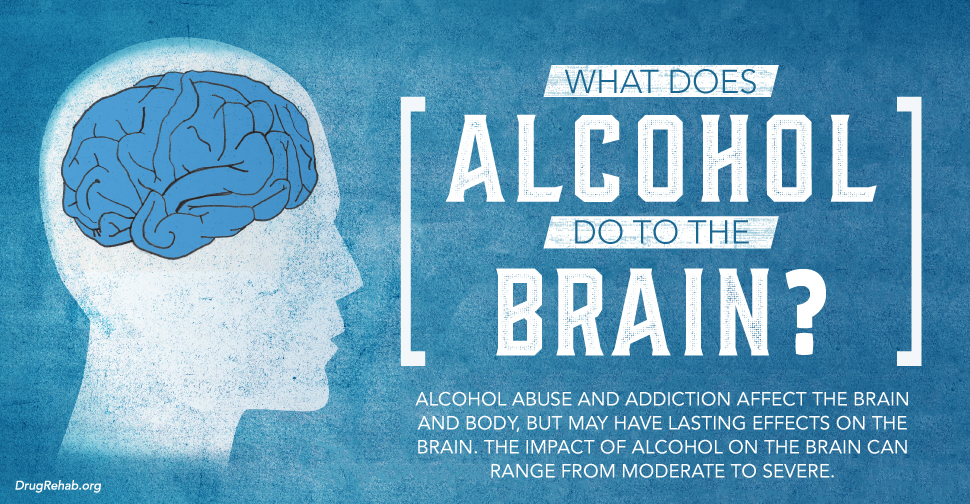
Alcohol abuse and addiction affect the brain and body, but may have lasting effects on the brain. The impact of alcohol on the brain can range from moderate to severe. One of the most dire effects is memory loss and changes. DrugRehab.org can direct you to treatment resources who can help you overcome alcohol abuse or addiction.
Over seven percent of adults (ages 18 and above) in the United States had an alcohol use disorder in 2012, according to the National Institute on Alcohol Abuse and Alcoholism (NIAAA). In addition, more than 850,000 youth ages 12-17 also suffered with the disorder. Abuse of alcohol is far-reaching, and it can have damaging effects to the brain and body.
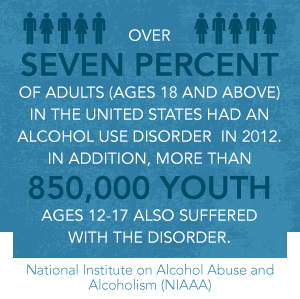
From short-term effects like slurred speech and blurred vision to long-term effects, such as memory loss and brain damage, it is clear alcohol has a negative impact on the brain.
About Alcohol Abuse And Addiction
People seek use of alcohol for many different reasons. Some may be looking for ways to cope with stress, others may need relief from symptoms of mental health issues like anxiety or depression. Still others may feel that alcohol provides a sense of calm and relaxation unmatched by other substances or in life.
While plenty of people can have a drink or two without developing addiction, many don’t have this luxury. That’s because when abuse turns to addiction, a person is no longer the only one in control of their thoughts and actions; they are ruled by their addiction to alcohol. Addiction is a force to be reckoned with, and it doesn’t give up easily.
How Does Alcohol Work In The Brain?
The NIAAA explains that, “exactly how alcohol affects the brain and the likelihood of reversing the impact of heavy drinking on the brain remain hot topics in alcohol research today.” Here’s what is certain about how alcohol works in the brain:
- Heavy drinking can have drastic effects, both short- and long-term, on the brain
- The effects can range from small gaps in memory to damaging conditions which can permanently debilitate a person
- Even moderate drinking results in impaired thoughts and actions
What Factors Influence The Effects of Alcohol?
How and to what extent alcohol affects the brain depends on a number of factors, including:
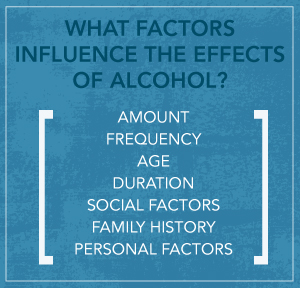
Amount:
- How many drinks per day, or at one time?
- How much alcohol is consumed over an extended period of time?
Frequency:
- How often does a person drink?
Age:
- When did the person first start drinking?
- The person’s current age
Duration:
- How long has the person been drinking heavily?
- How long has the person had an addiction to alcohol?
Social factors:
- Level of education
Family history:
- Genetic background
- Prenatal alcohol exposure
- Family history of alcoholism
Personal factors:
- Gender
- Overall health
What Are The Short-Term Effects Of Alcohol?
Alcohol interferes with the brain’s communication system, changing the way it works. This change affects mood and behavior, as thinking becomes difficult and movement becomes slowed. Some short-term effects may include:
- Blurred vision
- Memory gaps (blackouts)
- Slowed reflexes
- Slurred speech
- Trouble walking
Blackouts, or lapses in memory, are one of the ways alcohol affects the brain which cannot be explained. Blackouts can occur after only a few drinks, though memory gaps may continue to happen the more a person drinks. In fact, the NIAAA states that, “blackouts are much more common among social drinkers than previously assumed… regardless of age or whether the drinker is clinically dependent on alcohol.”
With such a drastic effect after moderate abuse, treatment for alcohol abuse and addiction can provide a welcome relief. DrugRehab.org can connect you with treatment resources.
What Are The Long-Term Effects Of Alcohol?
Prolonged abuse of alcohol can result in serious and permanent damage to the brain. The damage can be caused by the alcohol itself or from the breakdown in the body after years of abuse.
For example, many people abusing alcohol also have poor health in general or extensive damage to the liver. Inadequate sleep, improper nutrition, lack of exercise, and perhaps co-occurring disorders (a second substance addiction or mental disorder) can all affect the degree of damage to the brain caused by alcohol.
One important way the extent of brain damage is affected by these things is lack of nutrients. When a person does not get the proper intake of nutrients, resulting in a deficiency, that person’s brain cannot function as it is meant to do.
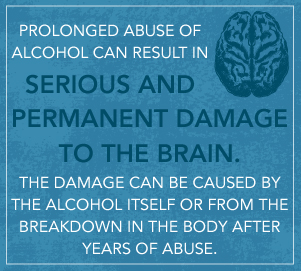
Certain brain disorders may occur as a result of long-term alcohol abuse. One such disorder is called Wernicke-Korsakoff Syndrome. This syndrome occurs due to a lack of the nutrient thiamine in the body. As many as 80 percent of those with an alcohol addiction lack this nutrient, the NIAAA explains.
Wernicke-Korsakoff Syndrome can go one of two ways: it can be “short-lived and severe” or it can be debilitating. The short-lived, severe version involves confusion, troubles with muscle coordination, and paralysis of the nerves that move the eyes. With this version of the syndrome, a person may not be able to walk or direct his or her way around without help.
When this syndrome persists, and the deficiency is not remedied, addicted individuals can develop psychosis. This ultimately results in learning and memory issues. People with this version of the syndrome can have troubles both remembering whole parts of their lives as well as recalling conversations which happened only hours before.
Use of alcohol can quickly become abuse, and abuse turns quickly to addiction. Before addiction overtakes your health, seek the help you need and deserve. Inpatient treatment centers offer quality, professional support and care.
Who Is Affected By Alcohol Abuse And Addiction?
As with so many substances of abuse, no one is immune to the risks of alcohol abuse. The Substance Abuse and Mental Health Services Administration (SAMHSA) reports that half the people in the United States ages 12 and older are “current drinkers of alcohol.” Women may be more affected by the effects of alcohol abuse, including damage to the brain, however men are more likely to report alcohol abuse overall. Though non-Hispanic white people account for the largest percent of people abusing alcohol, no demographic is unaffected by alcohol abuse.
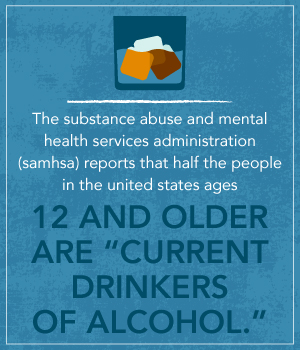
Available Treatments And Where To Find Them
Abuse of alcohol has been around for centuries, and effective treatment has not always been available. In the past few decades, though, treatments have improved, largely thanks to inpatient rehab centers.
Some of the most effective methods are:
- Behavioral counseling
- Alternative therapy
- Support groups
- Medication assisted therapy
- Gender-specific therapy
- Dual diagnosis treatment
Many of these treatments and more are offered at our inpatient rehab centers. If you or someone you know is struggling with alcohol abuse or addiction, don’t wait until you experience lasting effects to your brain. Contact us today at DrugRehab.org to learn how to get into treatment.
For More Information Related to “What Does Alcohol Do To The Brain?” Be Sure To Check Out These Additional Resources From DrugRehab.org:
- What is Alcoholic Hepatitis?
- Cocaine And Alcohol: A Deadly Combination
- Alcohol Poisoning – Over 50,000 Cases Each Year
- Alcoholic In The Family And Treatment Facilities
- Understanding Alcohol Addiction
Sources
Centers For Disease Control—Alcohol And Public Health
Drug Free World—Short- And Long-Term Effects Of Alcohol
National Institute On Alcohol Abuse And Alcoholism—Alcohol’s Damaging Effects On The Brain
National Institute On Alcohol Abuse And Alcoholism—Alcohol’s Effects On The Body
Substance Abuse And Mental Health Services Administration—Alcohol


